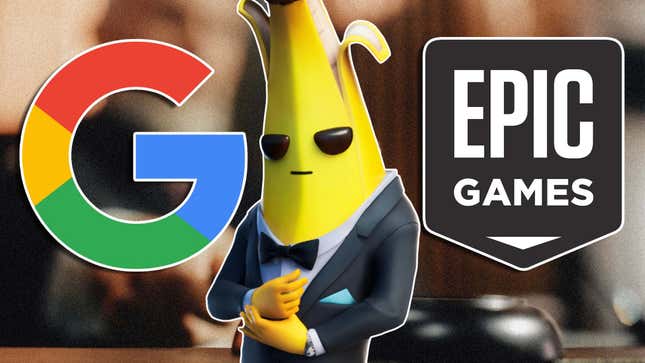
Epic Games sued Google over anti-competitive practices and won. A jury in the in the Epic v. Google case delivered a swift verdict, concluding that the giant tech firm was operating an illegal monopoly on Android devices in the form of the Google Play storefront.
The verdict included findings that Google not only abused the ties between its app store and billing services to harm companies like Epic Games, but that its distribution agreements with video game publishers like Activision, Ubisoft, Square Enix, and others were monopolistic as well. Judge James Donato still has to decide on which remedies the court will apply to rectify the problems, and Google has already announced it will appeal the outcome.
“Today’s verdict is a win for all app developers and consumers around the world,” Epic Games posted on its blog on December 12. “It proves that Google’s app store practices are illegal and they abuse their monopoly to extract exorbitant fees, stifle competition and reduce innovation.”
The verdict came after a suprisingly bonkers trial. The court case, which was meticulously covered by The Verge, included everything from Google seemingly destroying evidence to the company holding secret backroom deals with smartphone companies and game publishers. Google reportedly spent billions as part of “Project Hug” to try and effectively “bribe” Activision and others into not launching rival app stores so it could continue to maintain complete control over the Android marketplace. Testimony appeared to show a concerted effort by Google to stop big game companies like Epic, Riot Games, and others from launching rival app stores on Android devices, with the end result of that strategy being an absurdly profitable 30 percent flat fee on all Google Play store sales.
The Epic v. Google verdict stands in contrast to the Fortnite maker’s case against Apple, which it sort of won but mostly lost even as it waits to see if the Supreme Court will take it up on appeal. In that case, a judge (rather than a jury) decided Apple wasn’t a monopoly, though it would no longer be able to ban companies from telling users about how to pay them directly rather than going through the App Store (a caveat Apple is still trying to get reversed). Fortnite remains unavailable on iPhone to this day except through a really complicated Xbox cloud gaming method.
Epic’s win in the Google case, however, could have major ripple effects throughout the mobile gaming space and beyond. One big benefector could be Microsoft, whose $69 billion acquisition of Activision Blizzard appeared to be banking on a breakup of smartphone app store monopolies. “We have to break that duopoly of only two storefronts available on the major [mobile] platforms,” Microsoft Gaming CEO, Phil Spencer, said last year.
The tech giant has hinted that it might leverage mobile hits like Candy Crush, Call of Duty, and Diablo Immortals to open its own game store on portable devices. Microsoft CEO Satya Nadella recently said that giving up on the mobile market was one of the company’s biggest mistakes. Doing so would allow the company to collect 100 percent of the revenue from lucrative in-game microtransactions and ad deals, a market that dwarfs the traditional gaming console and PC markets.
EU regulators have also been pressuring Apple and Google to open up their mobile platforms and allow competitors to set up shop on them. Regulations demanding as much go into effect in 2024, and though they only apply to European countries, they could spur other countries, like the U.S., to adopt similar requirements.
“Victory over Google!” Epic CEO Tim Sweeney tweeted yesterday. “After 4 weeks of detailed court testimony, the California jury found against the Google Play monopoly on all counts. The Court’s work on remedies will start in January. Thanks for everyone’s support and faith! Free Fortnite!”